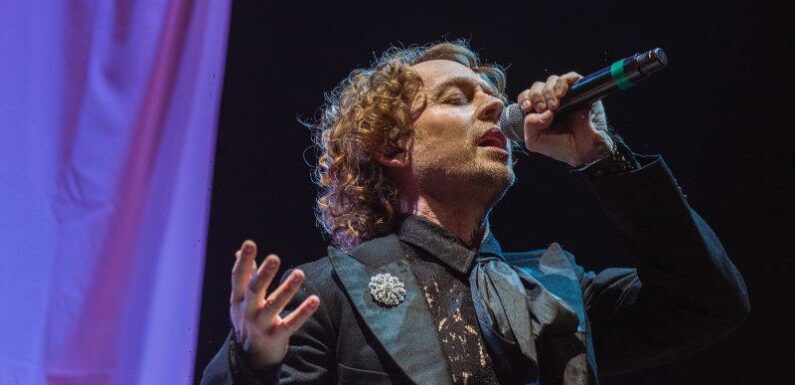
This wrap of shows includes Darren Hayes offering a glimpse into a different kind of Savage Garden, and an energetic performance filled with searing intensity by violinist Ilya Gringolts.
MUSIC
Darren Hayes ★★★½
Sidney Myer Music Bowl, February 4
Publicity for Darren Hayes’ Do You Remember? tour made it clear he’d be performing all the Savage Garden hits. Hayes’ ability to book a venue the size of Sidney Myer Music Bowl depends on that promise, and true to his word, he devoted half of the set list to the group’s two albums.
Darren Hayes performs at the Sidney Myer Music Bowl on February 4, 2023.Credit:Rick Clifford
But rather than a rehash of Savage Garden’s late-90s heyday, the Do You Remember? show was like an alternate timeline Savage Garden, one where the line, “I believe you can’t control or choose your sexuality” was underlined in bold, not hidden in the second verse of Affirmation.
In a piece published on Music Feeds last year, Hayes spoke of wanting to revisit his teen years “with the wisdom of a proud 50-year-old gay man”, a reimagined adolescence where he’d be “loved for who I truly am today”.
In front of a near-full Music Bowl, Hayes showed not even a skerrick of inhibition. He was on stage with three backing vocalists, a guitarist, a bass player and a drummer. Most of the ensemble was roped into a quasi-musical theatre production of choreographed dances and vague narrative symbolism.
Darren Hayes performs in Melbourne for his Do You Remember? tour.Credit:Rick Clifford
It was more Rock Eisteddfod than Broadway, but it was all wonderfully camp. Hayes looked comfortable in his own skin as he and Madeleine Coghlan engaged in a series of am-dram sketches that would’ve been cringe-worthy if it weren’t for the complete lack of pretension.
Hayes is on tour supporting his fifth solo LP, Homosexual, an album of queer disco bliss and identity reclamation. The record’s stylistic allegiance to 1980s disco and techno-pop, a la Donna Summer and Like a Prayer-era Madonna, prevented the half-dozen new songs from killing the mood.
But none could compete with Savage Garden’s era-defining ballads I Knew I Loved You, To the Moon & Back and Truly Madly Deeply, which got the multi-generational crowd in full voice. Hayes held his hands up in the shape of a love heart and thanked us for supporting him. “These songs are yours now,” he said.
Reviewed by Billy Burgess
MUSIC
Ilya Gringolts plays Bruch ★★★★½
Australian Chamber Orchestra, Melbourne Recital Centre, February 4
Fuelled by irrepressible energy, the Australian Chamber Orchestra’s start to 2023 offers an engrossing conversation between modernist and romantic styles facilitated by Russian-born violinist Ilya Gringolts, appearing as both guest director and soloist.
Mendelssohn’s precocious teen-aged String Symphony No.13 provides a refreshing start; its opening chromaticism and subsequent crisp counterpoint being dispatched with equal measures of elegance and verve.
Slanted, a new ACO commission by Sydney-based composer Harry Sdraulig, explores the search for “truth” in modern-day media. Sdraulig’s subtle handling of rhythmic and textural elements impresses, and his broadly modernist idiom is offset by some fervent soliloquies delivered by Gringolts and principal cello Timo-Veikko Valve.
This mixture of modernist and romantic elements forms an excellent prelude to the rarely heard Polyptyque by Swiss composer Frank Martin. Commissioned by violin virtuoso Yehudi Menuhin toward the end of Frank’s life, this 1973 work depicts six scenes from the passion of Christ, inspired by panels from a Siena altarpiece.
Gringolts brings searing intensity to this heartfelt score, particularly the solo passage evoking Gethsemane in the fourth movement, while offering hope of redemption in the finale’s Image of Glorification.
By way of contrast, Bruch’s crowd-pleasing Violin Concerto No.1 makes a splendid vehicle for Gringolts’ dazzling bravura, with the orchestra revelling in its folkloric elements and luxuriating in the lyrical Andante. While the arrangement for strings and timpani works well, the colour of the original’s wind and brass parts would add further lustre to this sparkling account.
Polish composer Grazyna Bacewicz’s Concerto for String Orchestra brings this generous program to an ebullient close. Among the many cameos in this latter-day Brandenburg Concerto are some beautifully rendered by principal viola Stefanie Farrands.
Hearing Gringolts and the ACO bring this heady mix of styles to life with such incredible stamina is a wonderfully energising experience.
Reviewed by Tony Way
A cultural guide to going out and loving your city. Sign up to our Culture Fix newsletter here.
Most Viewed in Culture
From our partners
Source: Read Full Article

